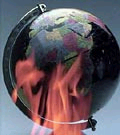Ecologists furious with USA as climate talks end in disappointment
 According to several environmental groups, USA and its Saudi allies deliberately obstructed and delayed discussion on future gas emissions cuts. Anyway, the Kyoto Protocol will enter into force on February 2005 as Russia already ratified it.
According to several environmental groups, USA and its Saudi allies deliberately obstructed and delayed discussion on future gas emissions cuts. Anyway, the Kyoto Protocol will enter into force on February 2005 as Russia already ratified it.

Anger, outrage and disappointment among most of delegations and conservationist groups paint the general mood that left the conclusion of the talks at the Tenth Summit on Climate Change last Saturday in Buenos Aires. According to several environmental groups, USA and its Saudi allies deliberately obstructed and delayed discussion on future gas emissions cuts.
“The agreement means that discussions on future greenhouse gas cuts will not progress substantially during the coming year and will not ensure that countries most at risk from climate impacts get the assistance they need from the industrialized world”, says a press release from Greenpeace. However, the group hopes that “everyone has taken note of the bullying and blocking tactics of the USA at these negotiations”.
In turn, the global conservation organization says that the Bush administration's tough tactics at the session “have hampered progress on global warming”. According to WWF, the US moved from non-interference at the conference to a strategy of active obstruction, using a series of wrecking measures.
"The Bush administration came to Buenos Aires with a clear agenda to stop any discussions about future action on climate change,” said Jennifer Morgan, Director of the WWF global climate change programme. “It has revealed its true colours -- defending the interests of Saudia Arabia and US fossil fuel companies at the expense of the worlds poor"
However, at the beginning, the summit had a completely different mood. Russia had just finished the institutional procedure to ratify the Kyoto Protocol, a bid to reduce gas emissions in long term. Russians delegates were welcomed like heroes with cheerful Russian dancers in honor of the country that made possible the dream of those concerned of the dreadful consequences of the global warming.
But that was at the beginning, a lot time ago, on December 7. Ten years later the mood was completely different, as the US delegation systematically blocked initiatives to boost the process, the summit began declining to an irrelevant final declaration, which does not contain any substantial progress.
“This agreement ensure that there will not be the kind of progress we need on negotiations of future emissions cuts during the next twelve months, and the adaptation package is far from adequate”, says Greenpeace Climate Campaigner, Steve Sawyer.
However, there is still a chance to get the situation reverted. According to WWF, US tactics failed to stop the start of informal talks on the future of climate change action. “Contrary to the wishes of the US, these talks offer the opportunity for countries to exchange views on future frameworks. Member states also adopted a work plan on adaptation measures to help the most vulnerable countries better deal with climate change impacts”, says WWF in a press release.
According to specialists, futher discussions will be held under the Kyoto protocol which will begin at the next UN climate change conference in November 2005.
Subscribe to Pravda.Ru Telegram channel, Facebook, RSS!


